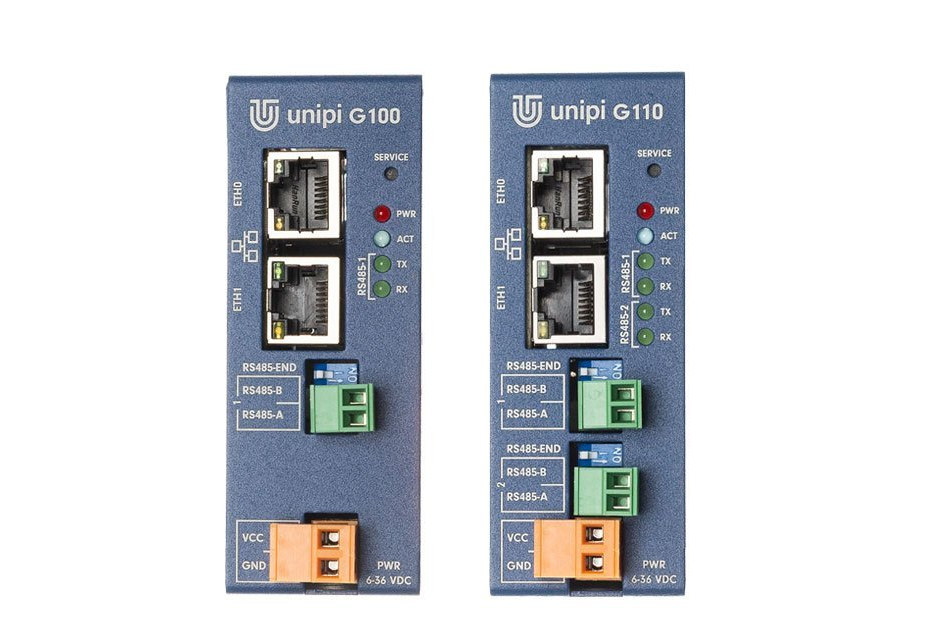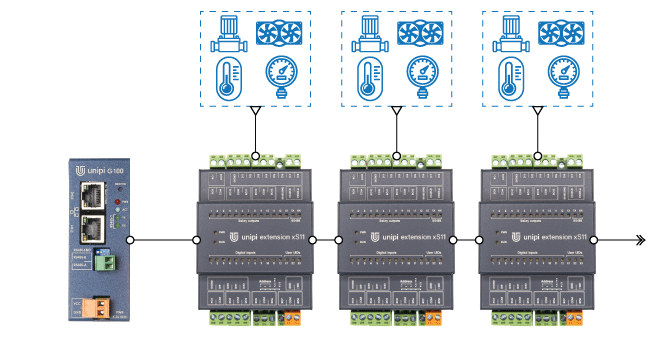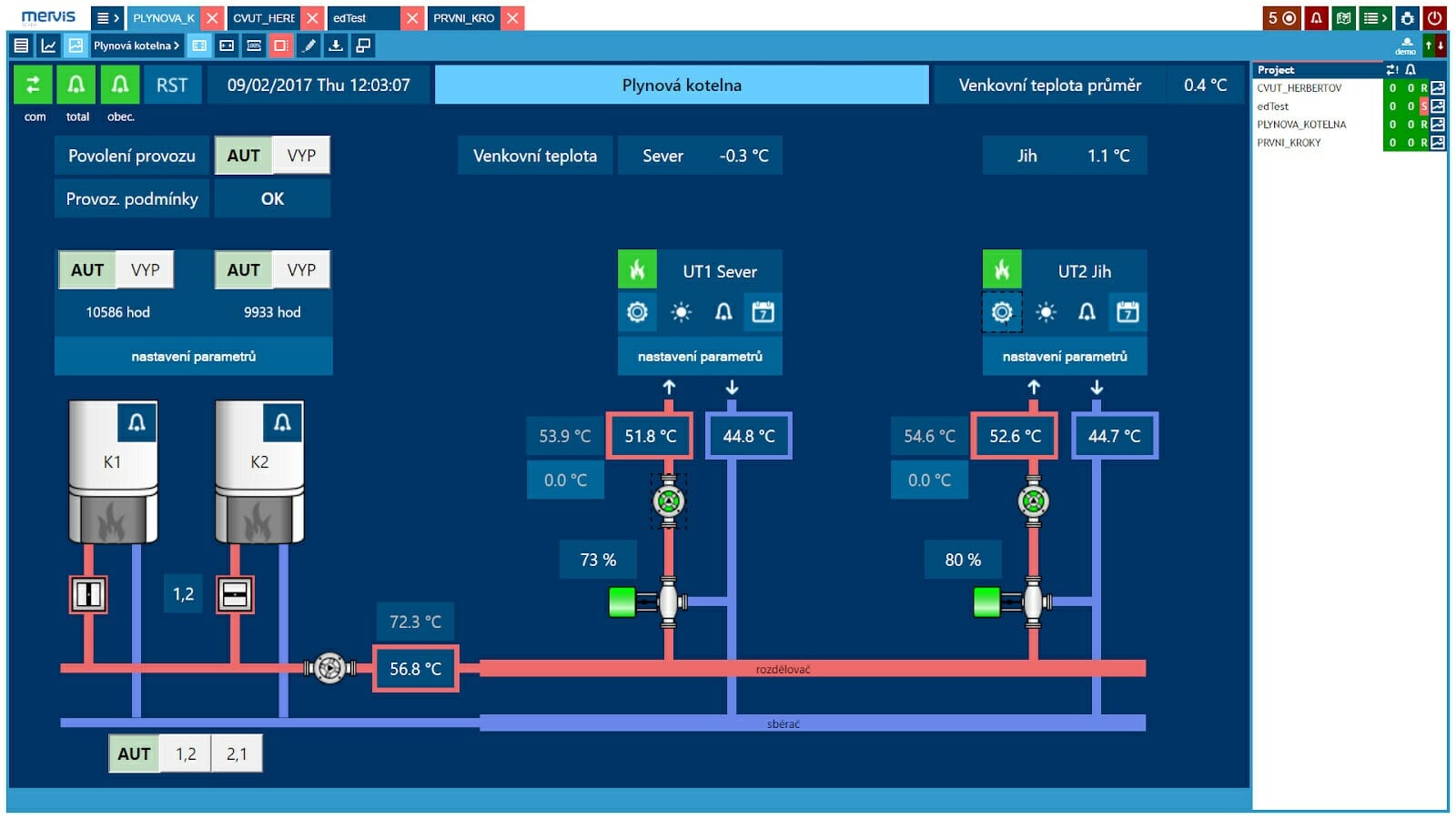Based in the Czech Republic, UniPi Technology design and manufacture programmable logic controllers, gateways, sensors and systems for smart homes, building management systems, industry and automation projects.
Their latest product is UniPi Gate G100/G110 Linux IoT gateway with Ethernet and RS485 interfaces. When the company contacted CNX Software about the gateway, they told us the system was based on a quad-core Cortex-A53 processor clocked at 600 MHz. Since we are not aware of such SoC, we asked, and UniPi told us it was Rockchip RK3328. That processor is normally clocked at 1.5 GHz, and it turns out the company purposely underclocked the processor to 600 MHz to extend the temperature range and reduce the heat emitted by the CPU.
 UniPi Gate G100 & G110 specifications:
UniPi Gate G100 & G110 specifications:
- SoC – Rockchip RK3328 quad-core Cortex-A53 processor @ 600 MHz
- System Memory – 512MB RAM
- Storage – 16GB eMMC flash, MicroSD card slot
- Networking – 2x Ethernet RJ45 ports (1x Gigabit Ethernet, 1x 10/100M Fast Ethernet)
- Sensor interface – 1x (G100) or 2x (G110) RS485 terminal blocks
- Misc – Power, Act, Ethernet status LEDs
- Power Supply – 6 to 36V DC via 2-pin terminal block
- Dimensions – 94 x 70 x 35 mm (DIN rail or wall mountable)
- Temperature Range – Operating: 0°C to +70°C; storage: -20°C to +85°C
- IP Rating – IP20

Unipi Gate G100/G110 Linux IoT gateway and logic controller is designed for industrial automation, building management systems and other automation projects, and for instance, can be used as a data logger in SCADA or MES control systems, or in cloud services within Smart City, Smart Factory and IoT/IIoT projects.
Unipi Gate runs Debian Linux based OS, and by default the gateway ships with Node RED preinstalled, but you could also order it with the a minimal image and install your preferred framework including Hone Assistant, Codesys, Domoticz, openHAB, and others, as well as UniPi’s own Mervis software.

UniPi Gate G100 and G110 gateways are available now starting at around 200 Euros including 20% VAT. More details can be found in the product page and announcement post.

Jean-Luc started CNX Software in 2010 as a part-time endeavor, before quitting his job as a software engineering manager, and starting to write daily news, and reviews full time later in 2011.
Support CNX Software! Donate via cryptocurrencies, become a Patron on Patreon, or purchase goods on Amazon or Aliexpress. We also use affiliate links in articles to earn commissions if you make a purchase after clicking on those links.





Rockchip’s official DVFS OPP table runs 408 MHz and 600 MHz both at 975mV while the 816 MHz entry uses only 50mV more: 1025mV. So why not ‘underclocking’ to 816 MHz instead which provides +30% CPU performance at almost no (thermal) costs?
Is it possible that this design saves the PMIC so the CPU cores are all the time fed with 975mV?
The reason can be stability. The main thing for this kind of gates is to run 24/7.
That’s a RK3288 happily jumping between different DVFS OPP, rebootet a month ago due to software updates and in service since years without any stability issues ever.
I wonder if putting so much (NodeRed etc) into the gateway is the right thing to do here.
IMHO you want the gateway to be dumb as a brick and have all of the stuff you need to constantly patch on a machine you don’t might rebooting all the time.
This isn’t Windows, so why would updating/patching require a reboot?
Well, there are kernel updates that usually require a reboot (unless you can make use of kernel live patching) and within the last 400 days the following packages also required a reboot for changes to take effect on a bunch of Linux machines: dbus, libc6, libssl1.0.0, libssl1.1 and zfs-dkms
Since being lazy I automated the task to check for such events…
>This isn’t Windows, so why would updating/patching require a reboot?
Since this thing is Debian based I guess it’s using apt so this doesn’t totally apply but with many embedded Linux thingies like this you do upgrades with two copies of everything so if the new version doesn’t work you can easily go back to the original. So you are booted into the A version, you update the B version and then rebooting into B leaving A as a fall back or to get overwritten by the next update.
But it doesn’t have to be a complete reboot to be a pain either. If you update services like nodered you need to restart them. If nodered is running some complicated flow that means you need to plan downtime to do the upgrade.
Unless nodered and everything has grown a working seamless upgrade feature…